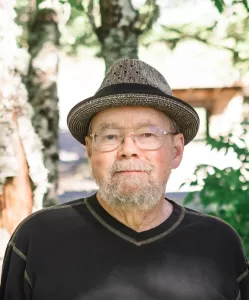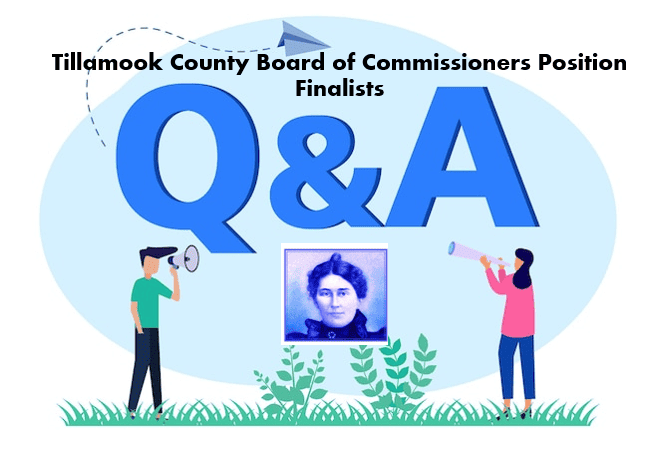EDITOR’S NOTE: With the open Tillamook County Board of Commissioners position due to Commissioner Yamamoto’s early retirement, the Pioneer has sent the finalists selected for the position our “Questions for the Finalists.” Even though community members won’t vote on who fills the seat and finishes the one year left in the term (County Commissioners Bell and Skaar will select the person to complete the term), we thought the community would like to get to know the finalists. The County Commissioners will host a Candidates Forum on October 12 from 5-8 p.m. at the PRI Building in Tillamook. There is a virtual option to attend here’s a link to the BOC page with the link to the meeting – https://www.co.tillamook.or.us/bocc/page/candidate-forum. A second forum on October 16, from 5-8 p.m. at Tillamook Community College, will be a panel interview conducted by the County Commissioners themselves. We know that not everyone will be able to attend (there are remote audio options available.)
We will post the answers from each finalist as we receive them.
Tillamook County – meet Paul Levesque

Are you planning to run for Commissioner in 2024, regardless of if you are selected?
No.
What is your WHY – Why did you apply for this position?
Based on 42 years experience in county government I believe I can provide a relatively seamless 12-13 month transition for county governance until voters are able to elect their next commissioner.
Relevant experience, qualifications for position:
The 42 years in county government have been primarily with the County Commissioners Office. Throughout that period, I held increasingly responsible duties, including but not limited to, Emergency Management Director, County Property Manager, Contract Officer, Management Analyst and Chief of Staff at the time of my retirement. During this time, I managed a number of programs, county departments and major projects. Throughout my tenure I also served as a board member on several intergovernmental agencies, including Tillamook Lightwave, eventually serving as president until my retirement. I have held positions on a variety of statewide boards, committees and public associations including the Oregon Public Property Managers Association.
What do you see as the top 5 priorities for the Commissioners this next year?
1. The unhoused population of Tillamook County.
2. Affordable Housing for all residents of Tillamook County.
3. Mitigating the financial impacts on the dairy industry and other development in the floodplain due to National Marine Fisheries Biological Opinion (BiOp) and Oregon’s Draft Plan that will severely restrict activities in the floodplain.
4. Countering the loss of state forest timber revenue due to the Board of Forestry’s proposed Habitat Conservation Plan (HCP).
5. Affordable high speed fiber optic connectivity to the premises through Tillamook Lightwave.
How should the county be addressing the mental health/substance use disorder crisis?
Mental Health:
Changes in state policy have imposed major complications on the County’s ability to deal with this issue. A state initiative called “Community Restoration” will move patients from the state hospital back to their counties of origin. Not only does this initiative come without funding but it also shifts a huge burden of legal liability to the counties and their third-party providers. In the last legislative session counties were able to at least secure a $2.9M litigation fund to defend liability claims: a drop in the bucket that would likely evaporate with just a few claims statewide. The counties are working with the Oregon Department of Administrative Services on a study, with a report due October 1.
Substance Use Disorder:
The voter approved Measure 110 has not worked and needs a major fix. This measure took the teeth out of law enforcement by decriminalizing certain quantities of illegal drugs. The County needs to continue work with the Association of Oregon Counties and the Association of County Mental Health Professionals on the needed repairs and advocate to increase funding to rural counties.
Commissioner Yamamoto has focused on specific issues – such as logging/forestry, the FEMA BiOp, and wind energy; What is your stance on the Oregon Dept. of Forestry’s Habitat Conservation Plan? Wind energy?
The Board of Forestry’s proposed HCP:
I strongly oppose the proposed HCP. The plan would severely limit timber sales on a significant portion of state forest lands; 47% of these lands are situated in Tillamook County. If the Board of Forestry adopts the Plan and enters into the proposed 70-year contract with the federal services, timber sale revenues will be critically curtailed to the County and the local taxing districts that potentially share those revenues. The Board of Forestry should instead continue its long-standing practice of “no take” as permitted under the federal Endangered Species Act.
Wind Energy:
There are many unanswered questions concerning offshore wind energy. Undersea cables, turbines and the resulting electromagnetic fields are potential issues for fish behaviors and habitats. Wind power should not come at the expense of fisheries. Estimates on the consumer cost of offshore wind power are 30 cents per kilowatt hour and upwards. Tillamook County electrical consumers currently pay less than one third that amount. Robust environmental and economic analysis must be completed before offshore areas are identified and leased.
Housing continues to be a challenge in Tillamook County. The county is just completing a year-long process of updating the STR ordinance and is facing a lawsuit from STR owners over “caps”. What is your view of how the BOC has addressed housing and STRs?
Housing:
The creation of the Tillamook County Housing Commission by the Board of Commissioners has had a significant impact in beginning to address affordable housing. Using some state grant funding and the net 75% Short Term Rental (STR) fees from operator licenses, the Housing Commission has been able to initiate a local grant program for developing affordable multifamily rental units. New standards for residential use of Accessory Dwelling Units (ADUs) within unincorporated communities have been adopted into the County’s Land Use Ordinance. I support these efforts and the further adoption of similar ADU standards for rural residential areas.
The Cap on STRs:
The County has identified 21 subareas of the county where significant numbers of STRs are operating. The Board of Commissioners has adopted a cap on licensing further STRs limited to existing STRs and a 1% growth within each subarea. I support this cap as a reasonable balance between private property rights and community liveability.
What is your vision for Tillamook County in the future?
A robust and sustainable economy; cost effective and stable budgets for local governments; access to clean, safe, affordable housing to all residents of Tillamook County; readily available services for people with mental health/substance use disorder and environmental sustainability.


.png)